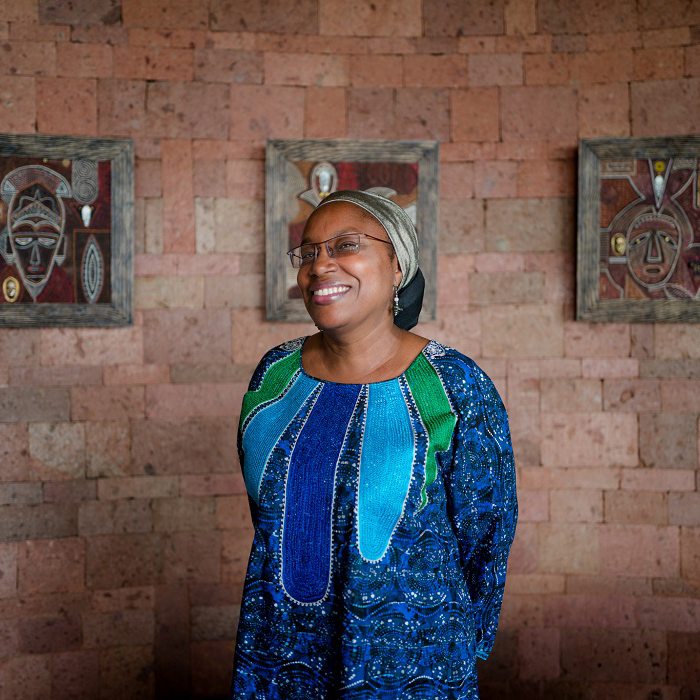Last November, U.N. Secretary-General António Guterres declined to renew the contract of U.N. Special Adviser on the Prevention of Genocide Alice Wairimu Nderitu, who did not label Israel’s war against Hamas a genocide, even while other U.N. officials have either done so or released reports which make this claim.
On November 26, an editorial in The Wall Street Journal cast Nderitu’s ousting as part of an unofficial U.N. campaign against the Jewish state and called her “refusal to endorse a lie in service of a political agenda” a “profile in courage.”
But it wasn’t until this week, after attending Monday’s 80th commemoration of the liberation of Auschwitz in Poland, on the site where more than 1.1 million people, the vast majority of them Jews, were murdered in the Holocaust, that Nderitu decided to speak out to tell the story of her contentious U.N. tenure.
“This push that I should say that there’s a genocide going on in Gaza? They knew that I’m not a court of law, and it’s only a court of law that can determine whether a genocide has happened,” says Nderitu, in an exclusive interview with Air Mail. “But I was hounded, day in, day out. Bullied, hounded, with protection from nobody.”
“It’s instructive that this never happened for any other war. Not for Ukraine, not for Sudan, not for D.R.C. [Democratic Republic of Congo], not for Myanmar,” she says. “The focus was always Israel.”
“This was a war,” she says. “Palestinians were killing Israelis, Israelis were killing Palestinians. It needs to be treated like other wars. In other wars, we don’t run and take one side and then keep going on and on about that one side… By taking one side, condemning it every day, you completely lose the essence of what the U.N. was created for.”
It “is completely wrong to insinuate that [Nderitu] was ‘bullied’ or that her contract was not renewed because of some sort of unofficial anti-Israel campaign,” says U.N. spokesman Stéphane Dujarric. “No member of the secretary-general’s cabinet … has declared the situation in Gaza to be a ‘genocide.’”
A longtime human-rights advocate who has mediated identity conflicts all over the world, Nderitu arrived at the U.N. from her native Kenya in November 2020, at the height of the pandemic. Sworn in virtually by Guterres, she was the first woman in her position. Initially, she served from her apartment; it wasn’t until July 2021 that she met her staff in person.

During the next two years, Nderitu developed tools to improve online monitoring of hate speech. She also traveled to refugee camps in Bangladesh and Iraq; to Brazil, where the government invited her to assess how the Yanomami and other Indigenous tribes were faring; to Serbia, Montenegro, and Bosnia and Herzegovina to assess the extent of genocide denial; and to Chad, to assess the risk to the various populations of Darfur in Sudan.
Nderitu held press conferences, wrote op-eds, and issued dozens of public statements, all without much, if any, controversy. Alas, not even the good kind. “For these other situations,” says Nderitu, “nobody seems to bother with what I say.”
Then came October 7, 2023.
Nderitu’s first statement on “the situation in the Middle East,” issued on October 15, called for the return of the Israeli hostages as well as a ceasefire. “And then I spoke about Hamas,” she says, “what they did. I described it.... And of course, the key thing that made me the enemy was saying that the attacks happened on Israeli territory, which they did.” (Hamas does not recognize the existence of the state of Israel, which was founded in 1948 and admitted to the U.N. in 1949.)
“This never happened for any other war. Not for Ukraine, not for Sudan, not for D.R.C., not for Myanmar. The focus was always Israel.”
That night, a U.N. Office of Human Rights civil servant sent her an e-mail on which he copied several top U.N. officials, including the United Nations high commissioner for human rights, and also the undersecretary-general for humanitarian affairs. (In February of 2023, that undersecretary-general would go viral for saying, in a television interview with Sky News, “Hamas is not a terrorist group for us. As you know, it is a political movement.”)
In his e-mail, the U.N. civil servant described Nderitu’s statement as “one-sided,” suggesting that it “might cause reputational risk on the image of the United Nations as an independent neutral impartial body.” For an institution as hierarchical as the U.N., this kind of direct written critique of an undersecretary-general by a junior staffer was highly unusual, as was his request that Nderitu review her “statement with the aim to ensure greater balance and harmonize it with similar UN leaders statements.”
Little more than a week later, Nderitu received a two-page letter signed by an unnamed group of “concerned UN staff including Palestinians.” While they joined her “in condemning the intentional attacks and abduction of Israeli civilians by Hamas,” they wrote, “we expected that your statement regarding Israel’s attacks on and collective punishment of Palestinian civilians would have been equally clear and unequivocal.”
That December 9, Nderitu hosted a commemoration of the 75th anniversary of the Genocide Convention, an event that she had been planning for a year. Speakers included judges and prosecutors who had served on the International Criminal Tribunals for Rwanda and the former Yugoslavia, and also Karim Khan, the chief prosecutor for the International Criminal Court. (This past November, the I.C.C. issued arrest warrants for Israeli prime minister Benjamin Netanyahu and then Israeli defense minister Yoav Gallant; neither has been arrested.)
On the same day as the commemoration of the Genocide Convention, another anonymous group, this one calling itself Concerned Citizens of the International Community, posted a petition calling for Nderitu’s resignation on Change.org, which garnered more than 22,000 signatures. “The gravity of her failures demands immediate action,” it stated. “We hereby demand an immediate and transparent review and investigation of the Special Adviser on the Prevention of Genocide on her failure to fulfill her mandate and to widely publish the outcome of this investigation.” (No such investigation occurred.)

Just two days later, on December 11, a second petition on Change.org, this one in support of Nderitu, was posted by an anonymous group called Humans for Human Rights. It received more than 7,000 signatures.
“They were lighting fires under me from every angle,” Nderitu says. While she continued releasing statements on the war in Gaza, including one in February 2024 in which she warned that “the risk of commission of atrocity crimes should a full military incursion into Rafah take place is serious, real, and high,” they were of no avail when it came to her critics. “It’s not about what I said,” Nderitu recalls. “The key thing is that I never called this genocide.”
Meanwhile, the social-media pages of Nderitu’s office were being inundated with threatening messages. “They started sending me the threats on my phone,” Nderitu says. “And then they even started threatening me on the U.N. e-mail.” “Filthy zionist rat, you will burn in hell forever for supporting the rape and torture and murder of little kids by your bestial masters,” read one such e-mail.
I first spoke with Nderitu last March for a story about her work as an international human-rights advocate and mediator, and about the pressure campaign against her that was then already underway. For that interview, which took place inside her spacious office on the 31st floor of the U.N.’s Secretariat Building, Nderitu wore a traditional African handmade floor-length dress and headwrap.
But this time we meet inside an Upper West Side apartment at which Nderitu arrived effectively incognito, wearing a mask and looking like any other New Yorker, dressed in a black sweater, black beret, and navy pants. “I didn’t want to stand out,” she says of her outfit.
“The first interview I was telling you it all ends at the peace table,” she reminds me, “and the sooner they do that the better. Well, they didn’t do that, and here we are so many deaths later.”
“They started sending me the threats on my phone,” Nderitu says. “And then they even started threatening me on the U.N. e-mail.”
In Nderitu’s final months at the U.N., the secretary-general’s daily press briefings became a forum where reporters, including those from Al-Arabiya, a Saudi state-owned outlet, and Al Jazeera, which is backed by the Qatari government, asked questions not just about Israel’s alleged genocide but also about Nderitu. “They made me the centerpiece,” she says. “Every day they were talking about me. Why wouldn’t she say there’s a genocide? Everybody thinks there’s a genocide. Why won’t she say it?”
At times, reporters at the U.N. briefings appeared to be making statements rather than asking questions. “A Burmese genocide scholar, Dr. Maung Zarni, returned from Israel and Palestine, where he witnessed first-hand the harrowing situation unfolding in Gaza. Hear what he said. I’m quoting him: ‘This is beyond what the Nazis embodied. I have never seen such sadistic violence,’” said reporter Abdelhamid Siyam of Al Arabiya on September 9.
“What is the question?” asked Dujarric, the spokesperson for the secretary-general.
“Do you agree with that characterization?” Siyam asked.
“I think we have been very clear on calling out and condemning violence against civilians,” replied Dujarric. “On this issue of genocide, you know what our answer is.” In December of 2023, Dujarric had told a reporter who complained that Nderitu had spoken out on Darfur, but been “silent on Gaza”: “She’s doing her job. As I’ve said here over and over again, you know, the labeling of an event as genocide is within the purview of the courts.”
“It’s too much, the focus on Israel,” Nderitu says, adding, “I really don’t think people care about Africans.... I went to Chad, and I met the refugees from Sudan, and they were telling me, Right now, nobody is paying attention to our country. If there is ever peace and the cameras go in, you will face the most shocking thing of the century, a genocide that was completely ignored.... The I.C.C., the I.C.J.: Where are you when it comes to Sudan? You are very efficient when it comes to Gaza.”
The secretary-general and his staff “have made every effort to bring to the attention of the world … the horrendous tragedy unfolding in Sudan—the only country in the world at present where famine has been officially declared—where civilians, including those who are starving, are being killed indiscriminately by the warring parties,” says the U.N. spokesman.
With the war in Gaza now apparently winding down, there is a “huge sense of expectation that the U.N. should play a key role in ending it,” Nderitu says. But given that Israel is currently being accused of genocide by South Africa in the International Court of Justice, which is a U.N. court—a charge that then secretary of state Antony Blinken called “meritless” in January of 2024—the idea of a U.N.-brokered peace seems like a pipe dream.
And yet Nderitu still has hope. Citing the transformative moment that took place in the Balkans back in 1995, she says, “In Bosnia-Herzegovina the parties also didn’t trust the U.N., and so it was an American, Richard Holbrooke, who ended up brokering the peace. We should be looking for more Richard Holbrookes.... We should stop relying too much on institutions.”
Johanna Berkman is a Writer at Large at AIR MAIL. You can read her story about Hamas in America here


